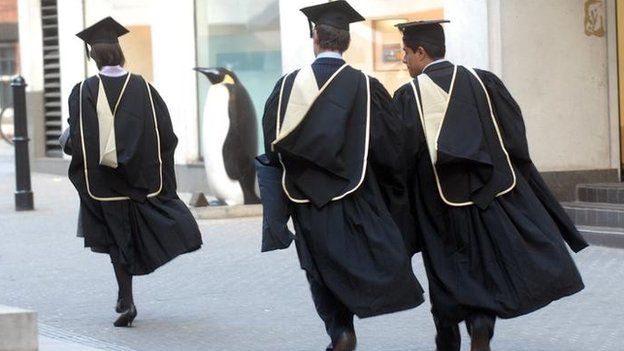Graduates 'should pay back fees to universities'
- Published

Graduates should pay their university a proportion of their future earnings rather than taking out loans, a report by a free-market think tank suggests.
The Institute of Economic Affairs (IEA) says student loans financed by the taxpayer should be scrapped.
The study says tying universities' income to that of students would be an incentive to produce top graduates.
Critics said the proposal would lead to a narrower curriculum and push up the cost of a university education.
The report says the current "malfunctioning system" of student loans should be abolished.
"The current student loans system is very badly designed," it suggests.
"It is arbitrary; graduates who earn around £40,000 a year pay the highest amount as a proportion of their income while very high earners pay much less.
"Furthermore, loans are forgiven, at substantial cost to the government, even if they could be repaid at a later date."
Better value
The IEA says replacing student loans with a levy on future earnings would improve value for money for students, because, with a direct interest in the future income of their students, universities would invest time and money in helping them do well in the jobs market.
It says the scheme would encourage universities to offer greater flexibility in terms of the nature, length and focus of degree-course subjects. This would also encourage students to consider part-time options, leading to a rise in participation.
The IEA says the proposed system would mean contracts would be written in such as way as to enforce loan repayment worldwide.
"Universities would be free to charge whatever they liked so that they could develop a wide range of courses, from advanced, high-cost courses that require significant contact time to low-cost online courses that can be completed quickly," it says.
"There would be incentives to provide courses that were better value for money and which led to higher earnings potential under the graduate equity scheme, and universities would be free to develop such courses and take on as many students as they wished."
Under the IEA's plan, universities would be free to agree with their students the details of the financial arrangements.
'Stifling regulation'
Currently students can take out government-funded loans to cover tuition fees, which are up to £9,000 a year.
Students from England and Wales pay back their tuition fee loans once they earn £21,000 a year; in Northern Ireland, they pay back once they earn £15,795 a year. Scottish students who study in Scotland do not pay tuition fees.
The debt is written off after 30 years.
Philip Booth, editorial and programme director at the IEA, said: "The current system of student finance will fail.
"It combines all the worst features of a graduate tax and a student loan system and gives little incentive for universities or students to succeed.
"The proposals laid out in this report will free universities from stifling regulation, and ensure that they offer students more variety in the duration of courses and give greater consideration to the future success of their students."
'Cash cows'
But the proposal met with criticism from other groups.
The group Million+, which represents new universities, said the idea would disadvantage the majority of students and lead to the privatisation of universities.
Chief executive Pam Tatlow said: "Instead of addressing the principal challenge of supporting a wide range of students into a well-funded, sustainable, higher education sector, this report argues for students to be commercialised and securitised.
"Higher education provides a range of benefits for society and the economy beyond the earnings of individuals. It is right that taxpayers have a significant stake in what universities do and that the state should be the lender for students."
The University and College Union said the proposals would lead to a narrower curriculum and push up the cost of a university education for many.
General secretary, Sally Hunt, said: "The proposed levy would incentivise universities to offer courses with the highest financial returns, leading to a narrower range of subjects for study. This is bad for student choice and the resilience of our economy.
"While we agree with the report's conclusion that the current system of loans is not working, we don't believe that trying to squeeze more money out of students is the answer to the problem - graduates should not be viewed as cash cows for universities."